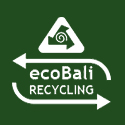Degradable plastic bags are merely a temporary cosmetic solution that has dangerous long-term consequences.
The Bali provincial government vowed in 2010 that Bali would be free of plastic waste by 2013, yet plastic waste is piling up at the rate of 1600 tons per day, an increase of more than 200% from last year’s plastic statistics. Villages are polluted and water-ways are choked with plastic. Instead of moving forward, the situation has gone from bad to worse.
Recent media coverage is reflecting a rising tide of public opinion: the plastic waste situation in Bali is dire and dirty. On 22 April 2012, the world’s top surfer Kelly Slater slammed Bali’s dirty beaches, saying ‘the pollution was unbelievable’ and would make it ‘impossible to surf here in a few years’:
The front page of the Bali Daily also featured a photo of a giant ‘ever-expanding’ illegal dumpsite in the mangroves of Nusa Dua highlighting environmentalists’ view of the government-sponsored program as ‘ineffective.’
Of course we can’t forget Time magazines dramatic piece titled “Holiday in Hell: Bali’s Ongoing Woes”. This negative exposure pressured the local government into investing in two large waste management machines used to clean up Kuta Beach. In addition to the environmental costs, this coverage will take its toll on Bali tourism. Yet the government is yet to respond. So what has the Bali government achieved since 2010 to make Bali plastic-free?
The Perda (Local Government Regulation) to implement the government’s 2010 vision outlined a program that would facilitate and engage communities to reduce, reuse and recycle (the 3 Rs) plastic including ‘stopping plastic at its source.’ It included plans for a task force to supervise recycling, infrastructure to collect it and technology to create fuel from plastic. In the three years to date evidence resulting from these initiatives, that focus reusing and recycling, is lagging.
So what about waste reduction? Surely ‘stopping plastic at is source ‘, rather than creating waste in the first place, would be the most effective method of tackling the waste problem. Instead the government wants to provide incentives to retailers to supply so-called degradable bags. However, promoting degradable bags will actually increase the overall amount of plastic waste as shoppers believe these bags are an environmentally-friendly option, and will not bother trying to reduce their use.
The ugly truth is that degradable bags do not fully degrade, especially in humid climates such as Indonesia. Even in environments where this type of plastic does break down successfully, bags only decompose into microfragments of plastic that remain in the environment. This is merely a cosmetic solution that has dangerous long-term consequences and costs to both human and environmental health.
Degradable bags contain high levels of heavy metals to promote degradation. These toxins are introduced into the food chain; seeping into farming land and poisoning the many animals and marine life that ingest them.
So, what can the Bali government do to make a dent in plastic waste before the 2013 deadline? One proposed solution is to simply ban the bag. If India and China, the world’s largest emerging consumer nations, can do it then so can Bali.
Last year the idea of a bag ban gained some momentum in Bali via the Responsible Retailer Roundtable, a coalition of government, retailers and green groups. Retailers were willing to comply with the ban as long as the government enforced it. However, the idea was dead in the water when the government took no action to implement the ban.
Banning the bag is an obvious first step in addressing Bali’s garbage problem, but such a sweeping measure requires strong government commitment to enforce it along with widespread public support. At this point in time, the Balinese Government has neither. Rather, it has an island of 3.5 million inhabitants who have become dependent on single-use plastic bags, and who expect the government to make the garbage disappear.
This state of affairs requires an integrated policy to support a progressive phase-out of single use plastic bags. Such a policy might include an initial bag tax, strictly enforced regulations and fines for illegal dumping as well as increased public education about the obvious need to clean up Bali.
Single-use plastic bags are the #1 consumer item in the world. They are used often for only minutes, but can pollute the environment for over 1000 years.
Bali Cantik Tanpa Plastik campaigns for a plastic free Bali through education and art. One of their efforts is to release the song “Tolak Tas Kresek” (refuse plastic bags) written and recorded by Navicula frontman, Gede Robi Supriyanto (Robi Navicula). The song is available for free download below, and is free for use in efforts to support a plastic free Bali. Download “Tolak Tas Kresek” here:













Pingback: Tolak Tas Kresek | Bali Clean